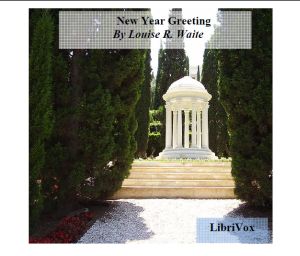Cruz e Sousa foi um poeta brasileiro, considerado um dos precursores do movimento simbolista no Brasil. Seus poemas são marcados pela musicalidade e pelo sensualismo, mesclado com uma espiritualidade e religiosidade de maneira às vezes espantosa. Broquéis foi seu livro de estréia, e contém algumas de suas obras mais famosas, como o poema Antífona, peça de abertura do livro. (Sumário escrito por Leni)
53 episodes
LibriVox volunteers bring you 9 recordings of A Letter to Her Husband (Absent upon Public Employment) by Anne Bradstreet. This was the Fortnightly Poetry project for January 24th, 2010.
9 episodes
This collection of lyric poems evokes the sea in every line, from birth (A Son of the Sea) to death (Outbound). The smells, sights and sounds of the Canada's East Coast feature prominently. (Summary by Sean Michael Hogan)
3 episodes
LibriVox volunteers bring you 17 recordings of Let Us Make Each Day Our Birthday by S.A.R., from The California Birthday Book (1909). This was the Weekly Poetry project for January 31st, 2010.
17 episodes
The Rape of Lucrece (1594) is a narrative poem by William Shakespeare about the legendary Lucretia. Lucrece draws on the story described in both Ovid's Fasti and Livy's history of Rome. In 509 BC, Sextus Tarquinius, son of Tarquin, the king of Rome, raped Lucretia (Lucrece), wife of Collatinus, one of the king's aristocratic retainers. As a result, Lucrece committed suicide. Her body was paraded in the Roman Forum by the king's nephew. This incited a full-scale revolt against the Tarquins led by Lucius Junius Brutus, the banishment of the royal family, and the founding of the Roman republic. (Summary by Wikipedia)
12 episodes
LibriVox volunteers bring you 10 recordings of Up The Line by Will Carleton. This was the Fortnightly Poetry project for February 7th, 2010.
10 episodes

LibriVox volunteers bring you 13 recordings of An Ode by Táhirih (Fátimih Baraghání) (1814/1817 – 1852), Translated by Edward Granville Browne (1862 – 1926). This was the Fortnightly Poetry project for February 7th, 2010.
Fátimih Baraghání (1814/1817 – 1852), also known by the titles of Táhirih (Arabic for “The Pure One”) and Qurratu’l-‘Ayn (Arabic for “Consolation of the Eyes”) was an influential Iranian poet and Bábí heroine from the town of Qazvín. Her legacy is important to Bahá’ís, as well as supporters of women’s rights in Iran. In 1844, she became the seventeenth disciple or “Letter of the Living” of the Báb (1819-1850). As the only woman in this initial group of disciples, she is often compared to Mary Magdalene. From June-July 1848, she attended the Conference of Badasht where she appeared without a veil in public (a shocking statement of women’s rights) and declared that a new religious dispensation had been inaugurated. Coincidentally, shortly after this, the Seneca Falls Convention (an important women’s rights convention) was held in New York on the 19th-20th of July, 1848. She was executed in Tehran in 1852. Before her death, she said that although she would be killed, they could not stop the emancipation of women. Edward Granville Browne described her thus: “The appearance of such a woman as Qurratu’l-‘Ayn is in any country and any age a rare phenomenon, but in such a country as Persia it is a prodigy—nay, almost a miracle. Alike in virtue of her marvellous beauty, her rare intellectual gifts, her fervid eloquence her fearless devotion, and her glorious martyrdom, she stands forth incomparable and immortal amidst her countrywomen.” This poem is a ghazal composed in the Kámil metre. A ghazal may be understood as a poetic expression of both the pain of loss or separation and the beauty of love in spite of that pain. Browne notes that this poem appears to be addressed to the Báb. Browne made a versified translation of the poem, which first appeared in the J.R.A.S. in 1899. (Summary by Nicholas James Bridgewater)
13 episodes
Robert Frost preferred to describe the New England countryside using everyday language. He used both as tools to explore world views and life philosophies. A Boy's Will was his first poetry anthology. (Summary by Bill Boerst)
4 episodes

Dante Gabriel Rossetti (1828-1882) and his sister Christina Georgina Rossetti (1830-1894) played important roles in the artistic milieu of Victorian England. Members of a highly cultured Italian immigrant family, they achieved widespread fame and exerted a significant influence upon the poetry and art of their time.
Dante Gabriel was a co-founder of the Pre-Raphaelite Brotherhood of painters, contributing to a renewed interest in medieval themes and techniques. Both his painting and his poetry anticipated the Aesthetic movement of the late 19th and early 20th centuries. His deep intellect and highly emotional nature are reflected in poems that exhibit a combination of complex symbolism and powerful feeling. He was a master of the sonnet form, as best exemplified in his book The House of Life.Christina served as a model for some of her brother’s early paintings, and she was closely identified with the Pre-Raphaelites. Her poetry is more accessible and displays perhaps a greater felicity of expression than her brother’s. Today she holds a higher reputation, often being ranked (sometimes rather condescendingly) among the leading women poets. Other critics, quite appropriately, consider her a major poet without the feminine label. A deeply devout person, she never married, although she eventually rejected two suitors, both for religious reasons. She produced a large body of Christian poetry, which is not represented in this collection. She also wrote many delightful poems for children. (Summary by Leonard Wilson)
35 episodes
LibriVox volunteers bring you 17 recordings of Believe Me, If All Those Endearing Young Charms by Thomas Moore. This was the Weekly Poetry project for February 14th, 2010.
17 episodes

LibriVox volunteers bring you 8 recordings of An Ode to Bahá'u'lláh by Nabíl-i-A'zam (Mullá Muhammad Zarandí). This was the Weekly Poetry project for February 21st, 2010.Mullá Muhammad-i-Zarandí (29 July 1831 – 1892), more commonly known as Nabíl-i-A`zam or Nabíl-i-Zarandí, was an eminent Bahá'í historian during the time of Bahá'u'lláh, and one of the nineteen Apostles of Bahá'u'lláh. He is most famous for authoring The Dawn-breakers, which stands out as one of the most important and extensive accounts of the ministry of the Báb. Besides writing a lengthy history of the Bahá'í Faith, he wrote poetry about the historical events of the religion, which he would send to the Bahá'ís of Iran. He learned about the Bábí Faith at the age of 16 and met Bahá'u'lláh in 1851. He made several journeys on behalf of Bahá'u'lláh, was imprisoned in Egypt and is the only person known to have made the two pilgrimages to the House of the Báb in Shíráz and the House of Bahá'u'lláh in Baghdád in accordance with the rites set out by Bahá'u'lláh. After the passing of Bahá'u'lláh, and at the request of `Abdu'l-Bahá, he arranged a Tablet of Visitation from Bahá'u'lláh's writings which is now used in the Holy Shrines. Shortly afterwards, overcome with grief, he walked into the sea and drowned. (Summary from Wikipedia)
8 episodes
LibriVox volunteers bring you 16 recordings of The Best Thing in the World by Elizabeth Barrett Browning. This was the Weekly Poetry project for February 28th, 2010.
16 episodes
LibriVox volunteers bring you 22 recordings of Faults by Sara Teasdale. This was the Weekly Poetry project for March 7th, 2010.
22 episodes
LibriVox volunteers bring you 9 recordings of Spring by "Michael Fairless" (pseudonym of Margaret Fairless Barber). This was the Fortnightly Poetry project for March 7th, 2010.
9 episodes
LibriVox volunteers bring you 11 recordings of The Consolation by Anne Brontë. This was the Weekly Poetry project for March 14th, 2010.
11 episodes

LibriVox volunteers bring you 7 recordings of New Year Greeting by Louise R. Waite . This was the Weekly Poetry project for March 21st, 2010.,The 21st of March is the ancient Persian festival of Naw-Rúz, also spelled "Noruz" (New Day) which is the Iranian and Zoroastrian New Year's Day. Naw-Rúz is also a Bahá'í holy day and the Baha'i New Year.Louise R. Waite (nee Spencer) was a Bahá'í poet and song writer. She wrote this poem, entitled “New Year Greeting”, for Naw-Rúz, which appeared in the Bahai Bulletin, Vol. 1. January-February-March, 1909, No. 5. According to an article which appeared in the same issue of the Bahai Bulletin: “Each Prophet or Manifestation of God, when he comes to the world, founds a new dispensation, a new time, for his followers…. To-day those who believe in Baha’u’llah, are establishing the Bahai time. It establishes a new method of reckoning… The New Year begins on the twenty-first of March, in accord with the teachings of our Revelator…”Referring to one of Waite’s poems in 1902, ‘Abdu’l-Bahá wrote: “All poems shall be forgotten in the course of time save those that are extraordinary. Thy poems shall be chanted with melody and best voices in the center of Worship (Mashriqu'l-Adhkár) forevermore.” In one Tablet, He referred to her as “Thou bird of pleasing tones” and in another as “Thou eloquent and expressive poetess”. On the 15th of April 1902, she married Edgar F. Waite. In 1910, ‘Abdu’l-Bahá gave her the spiritual name of Shahnáz Khánum (Lady Shahnáz). Shahnáz passed away in her sleep on the 27th of May 1939. (Summary by Nicholas James Bridgewater)
7 episodes
In this selection... the aim has been to bring within moderate compass a collection of these songs of the people which should fairly represent the range, the descriptive felicity, the dramatic power, and the genuine poetic feeling of a body of verse which is still, it is to be feared, unfamiliar to a large number of those to whom it would bring refreshment and delight. (Summary from introduction).
27 episodes
LibriVox volunteers offer you 12 different recordings of A Drinking Song from The Green Helmet and Other Poems (1912) by William Butler Yeats. This was the weekly poetry project for the week of April 11th, 2010.
12 episodes
LibriVox volunteers offer you 8 different recordings of His Books by Robert Southey. This was the fortnightly poetry project for April 11th, 2010.
8 episodes
The Versio Latina, or Latin translation of the works of Homer, has existed since the 14th century, but was first printed, under the name of Andreas Divus, in 1537. It is a crib, to give it no finer name, but a crib which had immense influence, being the first introduction to Homer for generations of mediaeval and early modern scholars. (Introduction by hefyd)
1 episodes
LibriVox volunteers bring you 8 recordings of What the Bullet sang by Bret Harte. This was the Weekly Poetry project for May 18th, 2010.
8 episodes
Aemilia Lanyer's 1611 poem is far more than a retelling of The Passion. It comprises a spirited defense of Eve (and, by extension, all women), elegant praises for her female patrons, a catalogue of virtuous women of the ancient world, and closes with the first "country house" poem written by a woman in English. (Summary by Elizabeth Klett)
6 episodes
LibriVox volunteers bring you 13 recordings of The Toys by Coventry Patmore. This was the Fortnightly Poetry project for April 25th, 2010.
13 episodes
LibriVox volunteers offer you 9 different recordings of Going down Hill on a Bicycle by Henry Charles Beeching. This was the weekly poetry project for the week of April 25th, 2010.
10 episodes
LibriVox volunteers offer you 28 different recordings of There Will Come Soft Rains by Sara Teasdale. This was the weekly poetry project for the week of May 2nd, 2010.
28 episodes
LibriVox volunteers bring you 17 recordings of 'Lydia is gone this many a year' by Lizette Woodworth Reese. This was the Fortnightly Poetry project for May 8th, 2010.
17 episodes
LibriVox volunteers offer you 17 different recordings of Hidden Gems by Ella Wheeler Wilcox. This was the weekly poetry project for the week of May 9nd, 2010.
17 episodes
The Excursion: Being a portion of The Recluse, a Poem is a long poem by Romantic poet William Wordsworth and was first published in 1814. It was intended to be the second part of The Recluse, an unfinished larger work that was also meant to include The Prelude, Wordsworth's other long poem, which was eventually published posthumously. The exact dates of its composition are unknown, but the first manuscript is generally dated as either September 1806 or December 1809. (Introduction by Wikipedia)
13 episodes
LibriVox volunteers bring you 22 recordings of To...:"With all my soul, then, let us part" by Thomas Moore. This was the Weekly Poetry project for May 16th, 2010.
22 episodes

Kabir (1440 - 1518) was a mystic poet and saint of India, whose writings have greatly influenced the Bhakti movement.The name Kabir comes from Arabic Al-Kabir which means 'The Great' - the 37th Name of God in the Qur'an.Kabir was influenced by the prevailing religious mood of his times, such as old Brahmanic Hinduism, Hindu and Buddhist Tantrism, the teachings of Nath yogis and the personal devotionalism of South India mixed with the imageless God of Islam. The influence of these various doctrines is clearly evident in Kabir's verses.The basic religious principles he espoused are simple. According to Kabir, all life is an interplay of two spiritual principles. One is the personal soul (Jivatma) and the other is God (Paramatma). It is Kabir's view that salvation is the process of bringing into union these two divine principles.His poems resonate with praise for the true guru who reveals the divine through direct experience, and denounce more usual ways of attempting god-union such as chanting, austerities, etc. His verses, which being illiterate he never expressed in writing and were spoken in vernacular Hindi, often began with some strongly worded insult to get the attention of passers-by. Kabir has enjoyed a revival of popularity over the past half century as arguably the most accessible and understandable of the Indian saints. (Introduction from Wikipedia)
3 episodes

The narrative poems in this collection are written by Sir Walter Scott - the well-known Scottish poet and novelist. Each of these five poems are based loosely upon German ballads: rewritten in flowing English meter.
* The Chase - a.k.a. The Wild Huntsman - A profligate, noble-born keeper of the royal forest - avidly addicted to the pleasures of the hunt - cruelly uses and mistreats his fellow-men. One day God's messengers come to test him: executing sentence immediately in just proportion to the huntsman's responses.
* William & Helen - William - long thought dead - unexpectedly returns at midnight from the crusades to marry his betrothed. Helen - relieved at his return - joyfully agree,s after initial misgivings: follows him on horseback into the night. Approaching the church in which they will celebrate their wedding: it is clear to Helen that all is not what it seems. But, with their mutual love strong enough to transcend death itself - what can possibly go wrong?
* The Fire King - Count Albert never returns from crusade: having being imprisoned by Saracens. Rosalie, his betrothed, swears to leave at once for Lebanon to find him. Rosalie succeeds - but alas, all is changed between them forever: and their parting is death itself.
* Frederick & Alice - Frederick breaks troth and abandons the beautiful Alice: sending her mad with grief. But Alice contrives to meet her faithless lover once more: beyond the grave.
* The Erl-King - The Erl-King (or Oak-King) sings for the soul of a human boy: who cringes for dear life within the arms of his father riding home through the dreary wood. But do spirits really have power to charm away the lives of the living?
(Introduction by Godsend)
5 episodes
LibriVox volunteers bring you 16 recordings of Little Homer's Slate by Eugene Field. This was the Fortnightly Poetry project for June 6th, 2010.
16 episodes
LibriVox volunteers bring you 14 recordings of A Sad Case by Edgar Fawcett. This was the Weekly Poetry project for June 6th, 2010.
14 episodes
LibriVox volunteers bring you 14 recordings of A Birthday by Christina Rossetti. This was the Weekly Poetry project for June 13th, 2010.
14 episodes
LibriVox volunteers bring you 9 recordings of It Couldn't Be Done by Edgar A. Guest. This was the Weekly Poetry project for June 29th, 2010.
9 episodes
LibriVox volunteers bring you 11 recordings of Inscription for an Old Bed by William Morris. This was the Weekly Poetry project for June 20th, 2010.
11 episodes
LibriVox volunteers bring you 12 recordings of If I Can Stop One Heart From Breaking by Emily Dickinson. This was the Weekly Poetry project for June 27th, 2010.
12 episodes
LibriVox volunteers bring you 5 recordings of America by Samuel Francis Smith. This was the Weekly Poetry project for July 4th, 2010.
5 episodes
LibriVox volunteers bring you 18 recordings of Ballad of the Tempest by James T. Fields. This was the Fortnightly Poetry project for July 4th, 2010.
18 episodes
LibriVox volunteers bring you 14 recordings of In The Long Run by Ella Wheeler Wilcox. This was the Weekly Poetry project for July 11th, 2010.
14 episodes
LibriVox volunteers bring you 16 recordings of Fidele by William Shakespeare. This was the Weekly Poetry project for July 18th, 2010.
16 episodes
What do you do for a fifth anniversary? We decided to have a collection of short works with a difference. We challenged our readers to find any short works which had 'five' in the title - in any language. They have done us proud, and the collection extends to three volumes of short stories, poems, fairy tales, memoirs, non-fiction and bible readings, in six languages. This is the first volume. (Summary by Ruth Golding)
See also Volume 2 & Volume 3.
20 episodes
What do you do for a fifth anniversary? We decided to have a collection of short works with a difference. We challenged our readers to find any short works which had 'five' in the title - in any language. They have done us proud, and the collection extends to three volumes of short stories, poems, fairy tales, memoirs, non-fiction and bible readings, in six languages. This is the second volume. (Summary by Ruth Golding)
See also Volume 1 & Volume 3.
20 episodes
LibriVox volunteers bring you 14 recordings of Life by Sir Walter Raleigh. This was the Weekly Poetry project for July 25th, 2010.
14 episodes
What do you do for a fifth anniversary? We decided to have a collection of short works with a difference. We challenged our readers to find any short works which had 'five' in the title - in any language. They have done us proud, and the collection extends to three volumes of short stories, poems, fairy tales, memoirs, non-fiction and bible readings, in six languages. This is the third volume. (Summary by Ruth Golding)
See also Volume 1 & Volume 2.
15 episodes
LibriVox volunteers bring you 11 recordings of Old Ireland by Walt Whitman. This was the Fortnightly Poetry project for August 1st, 2010.
11 episodes
LibriVox volunteers bring you 10 recordings of In Time of Pestilence, 1593 by Thomas Nashe. This was the Weekly Poetry project for August 1st, 2010.
10 episodes
Casimiro nasceu na Fazenda da Prata, em Capivary (Silva Jardim).A localidade onde viveu parte de sua vida, Barra de São João, é hoje distrito do município que leva seu nome, e também chamada "Casimirana", em sua homenagem. Estudou em Nova Friburgo. Com 13 anos foi para o Rio de Janeiro para trabalhar com o pai.Em 1853 foi para Portugal, onde entrou em contato com o meio intelectual e escreveu a maior parte de sua obra. Foi um dos poetas mais populares do Romantismo no Brasil. Seu sucesso literário, no entanto, deu-se somente depois de sua morte, com numerosas edições de seus poemas, tanto no Brasil, quanto em Portugal. Deixou uma obra cujos temas abordavam a casa paterna, a saudade da terra natal, e o amor - mas este tratado sem a complexidade e a profundidade tão caras a outros poetas românticos.Em 1859 editou as suas poesias reunidas sob o título de Primaveras.(Resumo adaptado da Wikipédia por Vicente)
71 episodes
LibriVox volunteers bring you 15 recordings of Epigram by Alexander Pope. This was the Weekly Poetry project for August 8th, 2010.
15 episodes
This is a collection of poems read by LibriVox volunteers for the month of August 2010.
31 episodes

















































